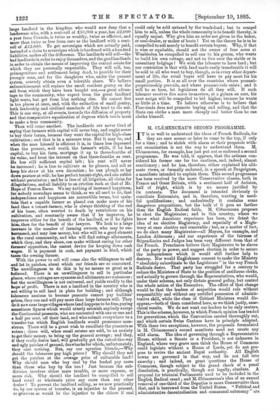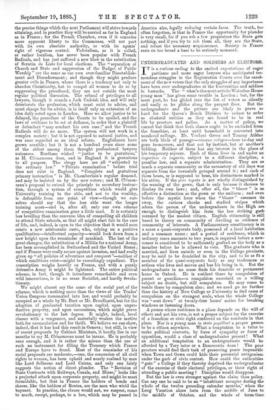M. CLEMENCEAIT'S SECOND PROGRAMME.
IT is as well to understand the ideas of French Radicals, for they are sure sooner or later to come to the top, if only for a time ; and to shriek with alarm at their proposals with- out examination is not the way to understand them. M. Clemenceau, for example, has just put out or endorsed a second programme. He was told, it appears, that the artisans con- sidered his former one far too cautious, and, indeed, almost reactionary ; and he has, therefore, either explained his ulti- mate views, or formally endorsed, in a speech at Draguignan, a manifesto intended to explain them. This second programme has been received by the more Conservative classes, both in France and Great Britain, with a sentiment half of derision, half of fright, which is by no means justified by
its contents. The document is intended obviously to conciliate Extremists, and is, therefore, wanting in need- ful qualifications ; and undoubtedly it contains some dangerous propositions, but the bulk of it goes no farther than the English Radical faith. M. Clemenceau proposes to elect the Magistrates ; and in this country, where we know what American experience has been, we detest the idea of an elective Magistracy, and especially of a Magis- tracy at once elective and removable ; but, as a matter of fact, we do elect many Magistrates—all Mayors, for example, and London Aldermen ; and our experience of the fairness of Stipendiaries and Judges has been very different from that of the French. Frenchmen believe their Magistrates to be slaves of the party in power, and suggest election in order to secure the independence which it would still further hell) to destroy. Nor would Englishmen consent to make the Ministry "absolutely subordinate to the Legislature" in the way French Radicals desire. That party has struggled for a century to reduce the Ministers of State to the position of assiduous clerks, and actually to govern through the Representatives, who would, under their scheme, not only dictate general policy, but control the whole action of the Executive. The effect of that change would be that the leaders of majorities would rule without responsibility and without any certified possession of adminis- trative skill, while the class of Cabinet Ministers would dis- appear,—both of them considered here, as we think justly, anar- chical results. We do not want our leaders to be only orators. This is the scheme, however, to which French opinion has tended for generations, which the Convention carried thoroughly out, and which certain Swiss Cantons have in principle adopted. With these two exceptions, however, the proposals formulated in M. Clemenceau's second manifesto need not create any wild alarm. The idea of governing through a Representative House, without a Senate or a President, is not unknown in England, where very grave men think the House of Commons could legislate without a House of Lords, yet do not pro- pose to revive the ancient Royal authority. All English towns are governed in that way, and do not fall into anarchy ; and indeed, on great questions the House of Commons, though subject to the grand check of a penal dissolution, is practically, though not legally, absolute. A proposal for triennial Parliaments used to be included in the English Radical creed ; and M. almenceau's idea of an annual removal of one-third of the Deputies is more Conservative than that, and is borrowed from the United States. "Political and administrative decentralisation and communal autonomy" are
the precise things which the next Parliament will strive towards attaining, and in practice they will be carried as far in England as in France ; for the French Chamber, even if it concedes more apparent liberty to the Communes, will not part with its own absolute authority, or with its agents' right of vigorous control. Federalism, as it is called, or rather localism, has never been popular with French Radicals, and has just suffered a new blow in the substitution of Scrutiu de Liste for local elections. The "separation of Church and State and suppression of the Budget of Public Worship" are the same as our own over-familiar Disestablish- ment and Disendowment ; and though they might produce greater evils in France, where there is a tendency not only to abandon Christianity, but to compel all women to do so by suppressing the priesthood, they are not outside the most regular political discussion. The refusal of privileges to all lawyers, though it sounds a Jack Cadeish idea, and will only deteriorate the profession, which must exist to advise, and must charge for its advice, is in itself only an extension of an idea daily acted upon in London. Here we allow justice to be delayed, the procedure of the Courts to be spoiled, and the laws of evidence to be set at defiance, in order that a plaintiff or defendant "may conduct his own case ;" and the French Radicals will do no more. The system will not work in a complex society ; but it is not opposed to natural justice, and was once regarded as an ideal reform. Englishmen have grown sensible ; but it is not a hundred years since some of the ablest among them thought professional lawyers nuisances. Bentham wished "justice to be gratuitous," as M. Clemenceau does, and in England it is gratuitous to all paupers. The clergy here are all "subjected to the ordinary law." "Private examination" before trial does not exist in England. "Complete and gratuitous primary instruction" is Mr. Chamberlain's regular demand, and may be insisted on by the new voters ; and M. Cl6men- ceau's proposal to extend the principle to secondary instruc- tion, through a system of competition which would give University training to the able, and not to the wealthy, is defensible from one point of view—though we our- selves should say that the less able want the longer training most—and is, after all, only our own scheme of competitive examination gone a little mad. It is certainly less levelling than the converse idea of compelling all children to attend State schools, so that all might start fair in the race of life, and, indeed, is open to the objection that it would soon create a new aristocratic caste, who, relying on a positive qualification—intellectual capacity—would look down from a new height upon the remainder of mankind. The last of the great changes, the substitution of a Militia for a national Army, has been accomplished in Switzerland and the United States ; and if France were really secure against invasion, and had really given up "all policies of adventure and conquest "—neither of which conditions exist—might be exceedingly expedient. The conscription weighs heavily on France, and with a purely defensive Army it might be lightened. The entire political scheme, in fact, though it introduces remarkable and even wild innovations, is in no sense ocialist, and hardly fevolu- tionary.
We might almost say the same of the social part of the scheme, which is nothing more than the views of the Trades' Union Congress transmuted into law, and would probably be accepted as a whole by Mr. Burt or Mr. Broadhurst, but for the adoption of graduated taxation upon capital, upon unpro- ductive property, and upon successions, which might prove revolutionary to the last degree. It might, indeed, level classes with a vengeance, and materially weaken the motive both for accumulation and for thrift. We believe we can show, indeed, that it has had this result in Geneva ; but still, in view of recent proposals by Cabinet Ministers, it hardly lies in our mouths to say M. 016menceau must be insane. He is probably sane enough, and it is rather the misuse than the use of such an instrument for filling the Treasury which France and Europe have to dread. Most of the remainder of his social proposals are moderate,—one, the concession of all civil rights to women, has been upheld and nearly realised by men like Lord Selborne and Lord Cairns, and only one fairly suggests the notion of direct plunder. The "Revision of State Contracts with Railways, Canals, and Mines," looks like a projected attack upon corporate property, and might be most formidable, but that in France the holders of bonds and shares, like the holders of Rentes, are the men who wield the bayonet. In practice, the clause would not, we suspect, come to much, except, perhaps, to a law, which may be passed in America also, legally reducing certain fares. The truth, too often forgotten, is that in France the opportunity for plunder is very small, for if you rob a few proprietors the State gets nothing, and if you try to rob them all, they are the State, and refuse the necessary acquiescence. Society in France rests on too broad a base to be seriously menaced.



































 Previous page
Previous page